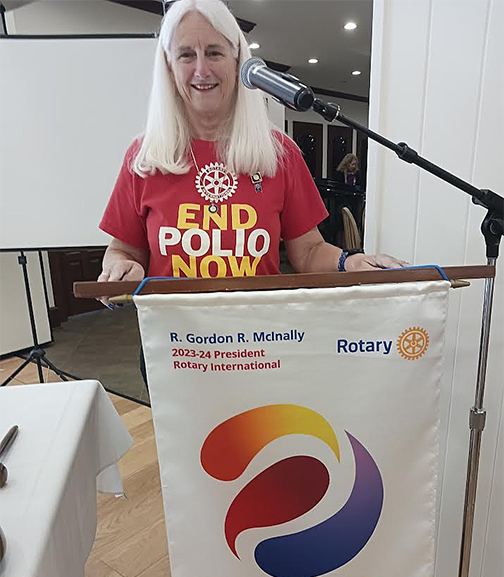Welcome!

Rotarian Debbie Scott is pushing the effort to eradicate polio around the world. Larry Penkava/Randolph Hub
Polio? Isn't that gone?
ASHEBORO — When people see Debbie Scott wearing her “End Polio Now” shirt, they ask her, “Wasn’t polio eradicated?” She responds by saying that was true in North America, but the fight goes on around the world.
Scott, a past district governor of Rotary, was pushing her message to Asheboro Rotary at Pinewood Country Club. She said she became a member of Rotary 29 years ago because her grandmother was a polio survivor.
The club’s regular meeting on Oct. 24 just happened to be World Polio Day and Scott, who now lives in Carthage, was there to let them know the fight, although close to complete success, is not yet over.
She said that when Rotary International chose to take on the fight against polio in the 1980s, the annual number of cases stood at about 365,000. This year, Scott said, there were eight confirmed cases — five in Afghanistan and three in Pakistan. By looking at a map, she found that the areas of infection were adjacent to one another, similar to neighboring Randolph and Guilford counties.
According to the website, www.endpolio.org, “Poliomyelitis is a highly infectious disease that most commonly affects children under the age of 5. Most know it as poliovirus. The virus is spread person to person, typically through contaminated water. It can attack the nervous system, and in some instances, lead to paralysis. Although there is no cure, there is a safe and effective vaccine — one which Rotary and our partners use to immunize over 2.5 billion children worldwide.”
Polio was a frightening epidemic in the United States during the first half of the 20th century. Even President Franklin Roosevelt was a victim. But the Salk, and later the Sabine, vaccine became available in the 1950s and school children across the country were vaccinated until the disease became almost non-existent in the US.
But other countries, especially in the Third World, continued to suffer from the polio epidemic. Then Rotary made a promise to eradicate the disease, and its local clubs, including Asheboro Rotary, donated to the cause, beginning in the mid-’80s.
Rotary partnered with national health organizations in the cause and later was joined by the Gates Foundation, founded by Bill and Melinda Gates, which pledged to give $2 for every Rotary dollar.
Jaci Betts, an Asheboro Rotary member, said the club had given $80,000 in the initial fight against polio and has since donated another $45,000. Members now are being asked to sign up with the Polio Plus Promise, committing to give $100 per year until polio is eradicated.
While confirmed cases of polio worldwide have dropped to single digits, Scott said, “We can’t be over this until it’s done, it’s over. We have to keep going. We’re so close.”
She said people ask her, “If it’s just eight cases, why do we need to raise more millions?” Scott said it takes money for surveillance, to monitor the presence of the polio virus in wastewater.
She talked about a polio case in New York last year. Officials learned that the virus was present in wastewater but didn’t know who the victim was. Finally, a young man went into a medical facility complaining that his legs were getting weaker. Tests showed that it was polio.
There are 800 facilities around the world that monitor wastewater for the presence of the polio virus. Many of those facilities are in Third World countries.
“We need to pay them to do that,” Scott said, “to protect us from polio. If we stop giving, the Gates will no longer match us 2 for 1. In 10 years, there would be 200,000 new cases if we stop giving. We’re letting our community know why we’re doing this.”
Mark Hensley, president of Asheboro Rotary, said, “We’re oh so close to eradicating polio.” He encouraged members to support the effort by committing to the Polio Plus Promise, giving Happy Bucks and buying raffle tickets, with all the funds going toward the fight against polio.
Scott looked forward to the time when “we will be able to tell our children and grandchildren that we were part of an organization that helped eradicate polio.”
